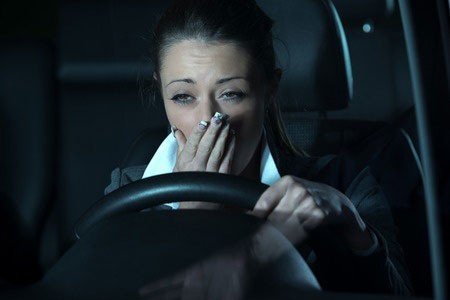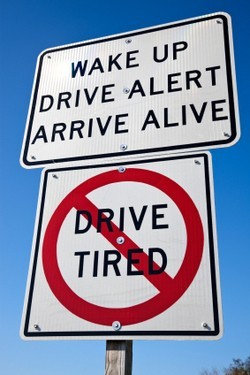Drowsy Driving

It’s happened to just about every driver at one point or another. At Joe Machens Body & Paint Center in Columbia, we want you to be around for a long time, so here is a brief article that will hopefully open up your eyes about the dangers of drowsy driving.
Wake Up and Get Educated about Drowsy Driving
The facts about drowsy driving accidents are staggering. About 100,000 crashes each year are caused by fatigued drivers, and 55% of drowsy driving crashes are caused by drivers less than 25 years old. Being awake for 18 hours is equal to a blood alcohol concentration (BAC) of 0.08%, which is legally drunk, and leaves you at equal risk for a crash. Therefore, in many ways. being drowsy is like being drunk behind the wheel. Drowsy driving used to be the #1 non-alcohol related cause for accidents, but now it has been trumped and lapped several times over by accidents caused by distracted driving (texting, cell phone usage and other distractions.) But, it’s still a national epidemic, and that’s why the folks at Joe Machens Body & Paint Center are offering you these helpful suggestions to wake up and get educated about drowsy driving.
How Can I Avoid Being One of These Statistics?
Here are some signs that should tell a driver to stop and rest:
- Difficulty focusing, recurrent blinking, or heavy eyelids
- Daydreaming; wandering/disjointed thoughts
- Problems remembering the last few miles driven; missing exits or traffic signs
- Yawning frequently or rubbing your eyes
- Trouble keeping your head up
- Drifting from your lane, tailgating, or hitting a shoulder rumble strip
- Feeling restless and bad-tempered
 Who’s At Risk?
Who’s At Risk?
The risk of having a crash due to drowsy driving is not uniformly distributed across the population. Research has identified young males, shift workers, commercial drivers and people with untreated sleep disorders or with short-term or chronic sleep deprivation as being at increased risk for having a fall-asleep crash.
Before you drive, check to see if you are:
- Sleep-deprived or fatigued (6 hours of sleep or less triples your risk)
- Suffering from sleep loss (insomnia), poor quality sleep, or a sleep debt
- Driving long distances without proper rest breaks
- Driving through the night, mid-afternoon or when you would normally be asleep
- Taking sedating medications (antidepressants, cold tablets, antihistamines)
- Working more than 60 hours a week (increases your risk by 40%)
- Working more than one job and your main job involves shift work
- Drinking even small amounts of alcohol
- Driving alone or on a long, rural, dark or boring road
Before Hitting the Road, Drivers Should:
- Get a decent night’s sleep. While this varies from individual to individual, sleep experts advocate between 7-9 hours of sleep per night for adults and 8 1/2-9 1/2 for teens.
- Plan to drive long trips with a companion. Passengers can help look for early warning signs of fatigue or switch drivers when needed. Passengers should stay awake to talk to the driver.
- Schedule regular stops, every 100 miles or two hours.
- Stay clear of alcohol and medications (over-the-counter and prescribed) that may impair performance. Alcohol interacts with fatigue, increasing its effects — just like drinking on an empty stomach.
- Seek advice from your physician or a local sleep disorders center for diagnosis and treatment if they suffer frequent daytime sleepiness, often have difficulty sleeping at night, and/or snore loudly every night.
- Consume the equivalent of two cups of coffee. Caffeine is available in various forms (e.g. soft drinks, energy drinks, coffee, tea, chewing gum, tablets). Remember, caffeine takes about 30 minutes to enter the blood stream and will not greatly affect those who regularly consume it. For best results, try taking caffeine and then a short nap to get the benefits of both.
If you’re aware of the possibility of drowsy driving around Columbia, the best advice is to pull over to a safe place and sleep it off. In most cases, it will only take 20 minutes to one hour and you’ll be back in the game; refreshed and renewed and back on the road.
This helpful advice is brought to you by Joe Machens Body & Paint Center in Columbia , because we want you to be safe, responsible and on the planet for many, many years to come!
Statistics courtesy of the NHTA.







 Who’s At Risk?
Who’s At Risk?
Social